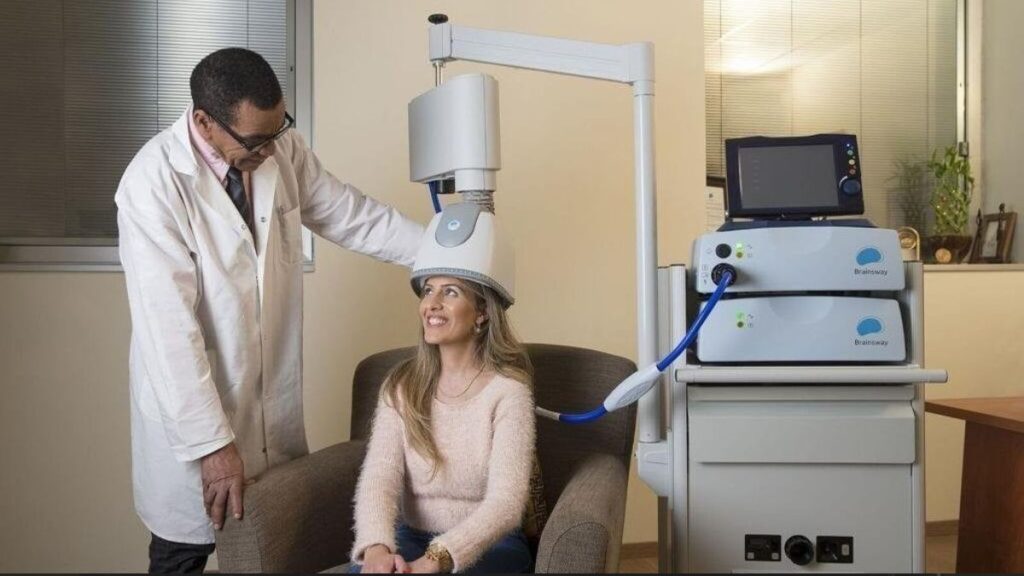Mental health is a big concern for many people. New treatments are being explored to help those who struggle.
One new option is Transcranial Magnetic Stimulation (TMS) therapy. This treatment uses magnetic pulses to help brain areas that control mood. It is often helpful for people who do not get better with regular treatments.
TMS gives hope to those looking for a different way to feel better. As more people learn about mental health, this therapy is changing how we treat conditions like depression. Keep on reading to learn more!
What Is TMS Therapy?
TMS therapy is a simple and non-invasive way to help with mental health conditions. It uses gentle magnetic pulses to stimulate brain cells linked to mood and emotions. This treatment is often helpful for people with severe depression who do not improve with medication or therapy.
A small magnetic coil is placed on the scalp, sending signals to specific parts of the brain. These signals help wake up areas that may not be working properly. Many patients start to feel better after several treatment sessions.
How Effective Is TMS?
Studies show that about half of the people who try TMS see major improvement. Some even experience full relief from symptoms. Since the therapy builds over time, regular sessions over a few weeks can provide lasting results.
Unlike medication, TMS does not cause side effects like weight gain or drowsiness. This makes it a great option for people looking for a drug-free alternative.
How TMS Therapy Works
TMS therapy sends safe magnetic pulses into the brain without surgery. These pulses help neurons fire more actively, making it easier for the brain to form new, healthy patterns. This process is called neuroplasticity and plays a key role in improving mood.
Each session lasts between 20 and 40 minutes. Patients stay awake, feel no pain, and can go back to their regular activities right after. Because TMS does not require anesthesia, it is an easy and flexible treatment for people with busy schedules.
Benefits of TMS Therapy
The benefits of TMS therapy stretch beyond just addressing depression. Here are notable advantages of incorporating this treatment into mental health care:
No Surgery Needed
TMS therapy does not require any surgery or cutting into the body. This makes it a safer choice for people who want to avoid medical risks.
Fewer Side Effects
Many people have trouble with medications because of side effects like nausea or weight gain. TMS therapy is different because it usually causes little to no discomfort.
Short TreatThan Depression
TMS therapy is not just for depression. It is also being used to help with anxiety, PTSD, and OCD, giving more people new hope.
Who Can Benefit From TMS Therapy?
TMS therapy can be a game-changer for numerous individuals facing challenges with their mental wellness. It is particularly beneficial for those who have not experienced relief from standard treatment options like therapy or medication. People with treatment-resistant depression, in particular, may find TMS therapy to be the key to their recovery.
Statistically, around 30% of individuals diagnosed with major depression do not respond adequately to traditional therapeutic interventions. For these individuals, TMS offers a new horizon of hope. As the understanding of TMS grows within the mental health community, more patients can access this breakthrough option, leading to improved outcomes.
In addition to depression, TMS is being investigated for its effectiveness in other mental health conditions. Early research indicates that TMS may help alleviate symptoms in people dealing with anxiety, chronic pain, and substance abuse disorders, establishing a broader relevance across various diagnoses.
Where to Find TMS Therapy?
The accessibility of TMS therapy has increased significantly in recent years. There are now more health clinics integrating it into their practice.
For those considering this treatment, it’s vital to consult a provider who specializes in TMS therapy. This is to ensure the best approach is tailored to individual needs.
One notable provider is Concierge TMS of Plymouth. They offer personalized services that cater to the needs of each patient.
As mental health initiatives continue to grow, the demand for specialized TMS therapy will only increase. They need to provide support for countless individuals seeking mental wellness.
The Future of TMS Therapy: Expanding Possibilities
TMS therapy is growing, with research showing it may help more than just depression. Scientists are studying how it could support people with anxiety, PTSD, OCD, and even conditions like chronic pain. As new studies emerge, the role of TMS in mental health treatment could expand, offering more hope to those in need.
Combining TMS with Other Treatments
Doctors are exploring how TMS can work alongside other treatments. Some patients may see better results when TMS is combined with therapy, medication, or lifestyle changes. By using TMS as part of a full mental health plan, doctors can help people more completely.
A More Holistic Approach
TMS could become a key part of mental health care, working with other therapies for better results. As research continues, new ways to use TMS may appear, making treatment even more effective. This could mean a future where more people get relief from their symptoms and enjoy a better quality of life.
A New Path to Better Mental Health
TMS therapy is changing the way people treat mental health conditions. It gives hope to those who have not found relief with other treatments.
As research continues, TMS may help even more conditions in the future. While it may not work for everyone, many people see real improvements in their mood and well-being.
If you or someone you know struggles with depression or anxiety, TMS could be worth considering. Finding the right treatment is important, and TMS offers a safe and effective way to feel better.
For more topics similar to this article, check out the rest of our blog!







